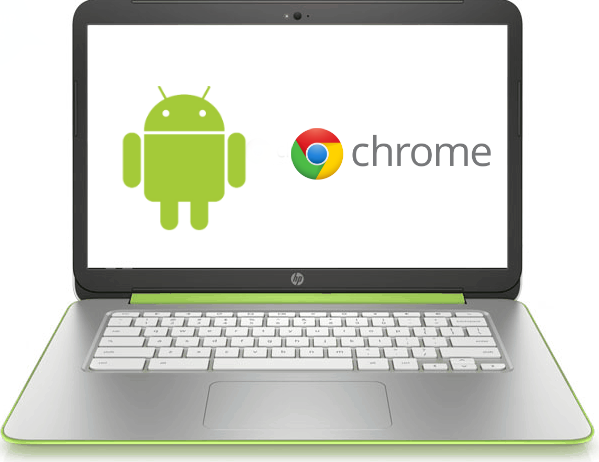
The existence of two Google developed operating systems, the massively popular Android for Mobile, and the more niche ChromeOS for desktop computing, has often confused tech pundits and seemingly consumers. But a report by the Wallstreet Journal is saying that a new blended OS could be coming in 2017, with a demo of the product to be shown off as early as next year.
The WSJ has cited the growing dominance of mobile computing as one of the drivers for Google blending their two operating systems, and though ChromeOS would be pulled into Android, Chrome as a browser would continue.
The Journal cited a comment on last weeks earnings call, where Sundar Pichai, CEO of Google, said ‘mobile as a computing paradigm is eventually going to blend with what we think of as desktop today’ as a hint at the blended OS.
The move would see Chromebooks rebranded…to something, and Android brought to the fore as the primary OS moving forward.
The build of Android as a the primary desktop computing interface would give users access to over a million apps through Google Play, as well as helping developers reach an audience of both desktop and mobile users – something Microsoft has been doing with their Windows 10 initiative, which sees one app essentially used on all their Windows 10 based platforms.
The move would also give Google a way to get services such as Search and YouTube, which the WSJ describes as their ‘moneymaking services’ in front of more people.
The plan at the moment is to introduce the unified OS in 2017, though a build will be shown off next year said one of the people ‘familiar with the matter’.
The combined OS would certainly make more sense with the launch of the Pixel C, the Android tablet that Google introduced at their recent Nexus launch event in San Francisco. The tablet/keyboard combo is very much in the vein of ChromeOS and many were surprised to see a Pixel branded tablet running Android rather than ChromeOS. This Halo product could be the keystone for trying out builds of the OS, with Google telling reporters at the event that the tablet would receive updates every 6 weeks.
Whether this report is based on the end result of a game of Chinese whispers, we’ll have to wait and see. As both a ChromeOS and Android fan, I see the utility of both, but if the functions I love from ChromeOS could be rolled into Android, it could be a real winner for Google here.
What do you think? Could Android and ChromeOS be meshed together? What parts need to be retained from ChromeOS to make it work?




There is a big appeal in Chrome OS’s simplicity. Not needing to worry about permissions, malware, etc.
And as developer, I’ve already stopped writing Android apps in favour of HTML5/CSS/JavaScript (for me, apps were dead about 4 years ago when browsers started auto updating and getting the latest HTML5 features).
So, I would prefer to see Chrome OS remain separate from Android.
Having said that. If trashing Chrome OS means Android improves faster, then it gets my vote (assuming we get a full Chrome browser, as Daniel mentioned).
Totally agree. ChromeOS is idiot-proof. I’m sure this means Google intends to make Android like that as well, along with all the other ChromeOS advantages – the Pixel C is proof of this. It will have the ChromeOS regimen of updates every 6 weeks, even though it runs Android. It’s the halo product to push the development forward.
Google should have just created ONE unified system from the start. There shouldn’t have been ‘ChromeOS’ and ‘Android’ running separately, it should all have been one OS, which could be adapted for multiple devices (but which, at its core, was identical).
Put it this way, after using several Android built laptops, I can definitely see the utility of Chrome OS. I have several Chromebooks and a Chromebox. The implementation of Android on a laptop isn’t as powerful for content creation as you find a Chrome OS device to be. The main sticking point for me is the mobile browser on Android is nowhere near as good as full desktop version of Chrome, mainly for extensions, but also in terms of the mobile website version is often inferior. This is mainly for things like posting on Ausdroid. I’ve used tablets with keyboards… Read more »
I’m hoping the Chrome browser will still be available to install on Windows.
I don’t think you have anything to worry about there.
ChromeOS apps are written in JavaScript, CSS and HTML.
Android and iOS native (not hybrid) apps can be written in JavaScript using ReactNative (et. al), albeit in two separate codebases.
It’s just a matter of time before we start using universal JavaScript to target both platforms.
Ionic is nice, but still doesn’t quite feel native enough, especially on devices older than 12 months.